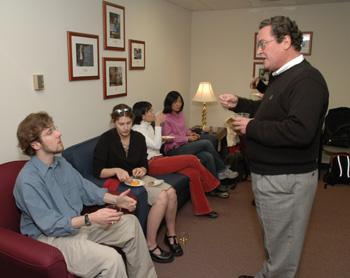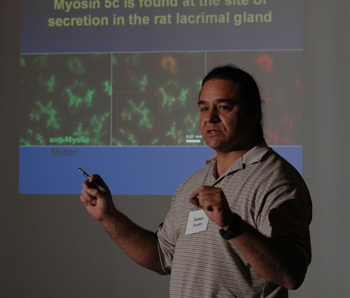

A publication of The Graduate School, University of North Carolina at Chapel Hill
On-Line Version Spring 2005
Home | Back issues | About us | The Graduate School | UNC-Chapel Hill | Make a gift

Carolina Graduate Student Center Opens
 |
| Graduate Education Advancement Board member Michael Harpold (right) speaks with students at the grand opening of the Graduate Student Center in January. |
Until recently, Carolina’s graduate and professional students had no central place on campus to call home. That changed January 27 with the opening of the Graduate Student Center.
Perched atop the Carolina Coffee Shop on Franklin Street, the Graduate Student Center will be a place where graduate and professional students from all departments can come to study, socialize and engage in each others’ research. Study space, conference rooms and space for student interactions are integral to The Graduate School’s vision for the center. By encouraging shared research ideas, interdisciplinary seminars and informal social interactions, The Graduate School hopes the centralized meeting space will foster a stronger sense of community among graduate and professional students and provide a richer Carolina experience.
The idea for the center originated with the Graduate Education Advancement Board, which spearheaded efforts to make the center a reality. Representatives from the Graduate and Professional Student Federation also worked with The Graduate School and the GEAB in this process.
“We at UNC are promoting interdisciplinarity. Yet our graduate students are totally consumed in their studies and research within their parent departments,” said Dr. David McNelis, a former chair of the GEAB. “A graduate student center, where students from across the campus and from all disciplines can hold meetings and seminars, and gather informally, provides the opportunity for this interdisciplinarity to flourish.”
Initially the center will provide meeting space on a reservation basis, and The Graduate School ultimately hopes to open the center for more informal, drop-in use. The Graduate School also hopes to move the center to a more central on-campus location – possibly in the lower level of Bynum Hall, below The Graduate School’s offices – although a move to a permanent space is not expected for at least two years.
Encouraging American Indian Community
 |
| Several prospective students canoed with Carolina graduate students during the American Indian Graduate Recruitment Weekend in November. |
 |
| Damon Jacobs, Oglala Lakota and a doctoral student in cell and molecular physiology, explains why he chose to pursue his research at Carolina. |
The Graduate School continues to reach out to the Native American community with events such as the American Indian Graduate Recruitment Weekend, held on campus Nov. 5-6, 2004. The event attracted 16 students from all over the state and as far away as New Mexico and Washington state.
North Carolina has the largest American Indian population east of the Mississippi River, but this group traditionally has been underrepresented in the state’s universities, particularly in graduate programs.
“By encouraging Native undergraduates to meet current American Indian graduate students, we hope to lead them to choose Carolina for graduate study,” said Sandra Hoeflich, associate dean for interdisciplinary education, fellowships and communication. “This is an excellent opportunity to demonstrate to these prospective students that they have a network of support and wonderful opportunities to succeed.”
The weekend featured discussions with current American Indian students, visits with graduate program faculty and staff, application and funding information sessions, and a presentation on what graduate degrees can do for students.
One highlight of the weekend was a reception allowing prospective students to meet Carolina’s American Indian students and alumni and enjoy music by North Carolina Lumbee musician Willie Lowery. Other activities included presentations by Mickey Locklear, Project Director with the North Carolina Commission of Indian Affairs, and Carolina faculty Susan Lord, Kathleen DuVal and Danny Bell.
Jennifer Taylor, a Cherokee and Carolina biology doctoral student, organized the event as part of her role as American Indian recruitment assistant with The Graduate School.
“All the students really
enjoyed it,” she said. “They felt very pleased to feel a connection
with the Native American community before they even applied to the school.”
© 2002, The Graduate School, The University of
North Carolina at Chapel Hill
All text and images are property of The Graduate School
at the University of North Carolina-Chapel Hill. Contact Sandra Hoeflich
at shoeflic@email.unc.edu
to request permission for reproduction.